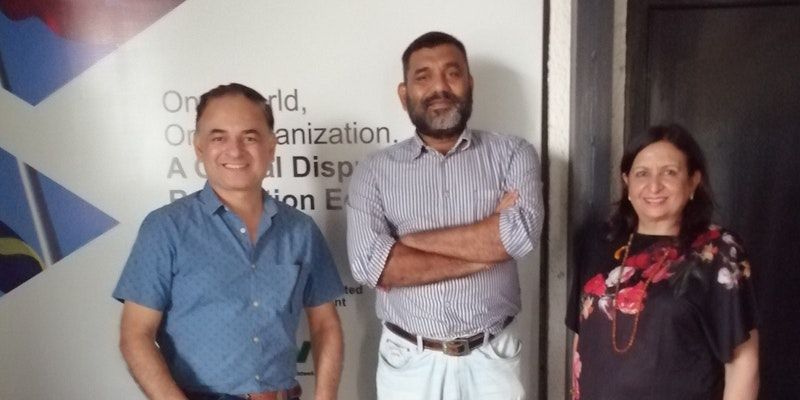Bootstrapped FICM’s Mediation Hub aims to make legal services simple
Delhi-based Federation of Integrated Conflict Management's portal Mediation Hub is a platform focussed on making different legal services simple and effective.
If there is one issue entrepreneurs will want to avoid among the many other challenges they face is a court dispute. The primary reason being it is a long-drawn and expensive process. The proceedings can go on for a long period of time, and many times the disputes do not even find a final solution.
While there are court-annexed mediation centres dominated by advocates, the arbitration arena is also dominated by retired judges. However, the processes are still cumbersome. Despite many efforts and reforms taking place in the recent years, the status quo remains.
It was something that led Krishan Kakkar to start The Federation of Integrated Conflict Management (FICM), and its portal Mediation Hub in Delhi in 2017. Krishan was later joined by his friends Suman Arora and Kulpreet Yadav.
The startup offers services around prevention of disputes, resolution of disputes, and training and development. Krishan says, currently dispute prevention is still not the core of law practice, and a relatively unexplored area.

(L-R- Kulpreet, Krishan, and Suman)
How it all started?
Krishan says it was one moment that shook his conscience. “I used to visit the court chamber of my lawyer for some personal issue, and one day I saw a very old man who had come to the lawyer after travelling a very long distance to appear on the date, only to find that the lawyer had got a new date of hearing the case four months ahead. The man who had made the unimaginable effort in a hope that the court will listen and move, had to go back bearing all the costs - travel, time, and the lawyers expenses,” says Krishan.
Seeing this, out of curiosity, Krishan asked his lawyer about the issue, and realised the man was doing court rounds for over a decade, and had put in all his savings to fight a property dispute. And the decision was still pending.
“The idea of setting up an entity to address the frustrating and almost never-ending litigations in Indian courts gradually firmed up as I saw the sufferings of people in every strata of the society. People simply need prevention of damaging conflicts and quick relief. We have created a system to address this need of people, families, businesses, and governments,” says Krishan.
Once he had the idea in place, he roped in his friends - Suman Arora, a lawyer; and Kulpreet Yadav, an anger management expert.
How it works?
Speaking about the preventive approach service it offers, Krishan says: “FICM’s preventive approach minimises potential areas of dispute through extensive planning in order to reduce the number of conflicts that escalate or crystallise into formal disputes”.
Under the preventive approach, it has the document defence schemes. Here, the client sends FICM the contracts they have entered into or about to enter with other companies. The platform then generates a Contract Registration Number (CRN) for the same. On the payment of appropriate fees or as a benefit to the existing members of FICM, the contract is vetted by legal experts in order to minimise the risk of disputes.
“We recommend appropriate dispute resolution clauses in order to address the resolution of any dispute, which may occur despite all plugins,” says Krishan.
Different resolution modules
For businesses and corporations working with other countries, FICM offers a membership service called Global Business Compliance Council (GBCC). The member companies can avail many facilities and benefits like vetting of their contracts as per country laws - particularly cross border business contracts; model contracts for almost all types of transactions; networking within the members; showcasing the presence of their companies at the international level; and getting the best of arbitration, mediation, and dispute resolution help in times of need.
“FICM has setup new ombudsman schemes for self-regulated corporations to deal with disputes with employees and customers,” says Krishan.
The service prevents and provides early resolution, and ensures that corporations preserve the relationship with their most valuable stakeholders - the employees and the customers. To resolve disputes, FICM is also promoting the concept of mediative justice, where the parties are encouraged to resolve disputes amongst themselves.
Working along a network
“To this effect, the organisation has introduced various systems, schemes, services, and initiatives that target specific requirements and focuses on addressing the challenges of modern world,” says Krishan.
The platform has a Mediation and Conciliation Network (MCN) comprising of highly regarded national and international negotiators and mediators. MCN essentially promotes the use of mediation, conciliation, and a host of various innovative and customised methods of dispute resolution involving the conflicting parties.
The startup's Dispute Management Group (IDMG) resolves and manages business and legal disputes. The group also offers customised dispute resolution services locally and globally. There is also Dispute Review Boards (DRB), which not only helps settle these disputes, but also has a method in place to prevent the dispute from happening.
“FICM has 1500+ neutrals and counsels on its panel, who hail from different backgrounds and domains, and are trained and experienced in modern day dispute resolution systems. The system operates in a completely transparent manner, wherein the fees set out by a neutral is paid to them, while the FICM charges administrative fees from the parties concerned,” says Krishan.
ALSO READ

Focus on international disputes
As part of “Global Dispute Prevention and Resolution Ecosystem”, International Commercial Disputes Tribunal (ICDT) responds to the needs of global trade for prevention and resolution of international commercial disputes.
Parties in dispute resolution proceedings can draw up on a growing member base of over 1,500 independent neutrals and experts from over 50 countries around the world.
As of now, ICDT’s specialised dispute tribunals include Construction Disputes Tribunal, Maritime/Marine Disputes Tribunal, Insurance/Reinsurance Disputes Tribunal, Intellectual Property Disputes Tribunal, Technology Disputes Tribunal, International Investment Disputes Tribunal, Energy, Aviation and Defence Disputes Tribunal, Healthcare and Life Sciences Disputes Tribunal, etc.
There is also FICM academy, the company’s training and development arm. “Our training creates best-of-breed new world dispute resolvers and conflict managers in law students, practicing lawyers, corporate leaders, professionals, social workers, judges, and other leaders and stakeholders of our business and society,” he says.
The revenue and market
The need for legal services is fast growing, and the market is believed to be $1.3 billion. There are startups like Business Setup, Vakilsearch, IndiaFilings, LawRato, and NearLaw competing in the same space.
While the team refused to share revenue details, it said its first source of revenue is the membership and training fee. Krishan says the company charges a membership fee from people across 70 countries. The team also gets money from online and other training courses targeting young students, practicing professionals, in-house corporate teams, etc., and collects fee from dispute resolution services.
“We operate along various dispute systems and schemes targeting businesses and corporations to help them with dispute resolution across all functions and departments of the organisation, and also with internal and external stakeholders," he says.
At present, it is also making revenue from dispute resolution services such as ombudsman schemes for employees and consumer of corporations, arbitral tribunals for domestic and international commercial disputes of companies, neutral appointing services for ad-hoc as well as institutional dispute resolution, contract negotiation, drafting and review for corporate members of the organisation, etc.
Speaking about future, Krishan says, “Our mission is to create one global ecosystem - Intend to offer the world a borderless alternative dispute resolution system and associated training. A mission that will take many teams to accomplish the goal”.
(Edited by Megha Reddy)










![[Weekly funding roundup April 20-26] VC investment dips as startups resort to debt capital](https://images.yourstory.com/cs/2/220356402d6d11e9aa979329348d4c3e/funding-lead-image-1669386008401.jpg)


